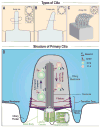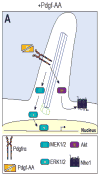Sending mixed signals: Cilia-dependent signaling during development and disease
- PMID: 29548942
- PMCID: PMC6136992
- DOI: 10.1016/j.ydbio.2018.03.007
Sending mixed signals: Cilia-dependent signaling during development and disease
Abstract
Molecular signals are the guiding force of development, imparting direction upon cells to divide, migrate, differentiate, etc. The mechanisms by which a cell can receive and transduce these signals into measurable actions remains a 'black box' in developmental biology. Primary cilia are ubiquitous, microtubule-based organelles that dynamically extend from a cell to receive and process molecular and mechanical signaling cues. In the last decade, this organelle has become increasingly intriguing to the research community due to its ability to act as a cellular antenna, receive and transduce molecular stimuli, and initiate a cellular response. In this review, we discuss the structure of primary cilia, emphasizing how the ciliary components contribute to the transduction of signaling pathways. Furthermore, we address how the cilium integrates these signals and conveys them into cellular processes such as proliferation, migration and tissue patterning. Gaining a deeper understanding of the mechanisms used by primary cilia to receive and integrate molecular signals is essential, as it opens the door for the identification of therapeutic targets within the cilium that could alleviate pathological conditions brought on by aberrant molecular signaling.
Keywords: Hedgehog; Migration; Pdgf; Primary cilia; Proliferation; Wnt.
Copyright © 2018 Elsevier Inc. All rights reserved.
Figures





References
-
- Afzelius BA. A human syndrome caused by immotile cilia. Science. 1976;193:317–319. - PubMed
-
- Albrecht-Buehler G. Phagokinetic tracks of 3T3 cells: parallels between the orientation of track segments and of cellular structures which contain actin or tubulin. Cell. 1977;12:333–339. - PubMed
-
- Arts HH, Doherty D, van Beersum SE, Parisi MA, Letteboer SJ, Gorden NT, Peters TA, Marker T, Voesenek K, Kartono A, Ozyurek H, Farin FM, Kroes HY, Wolfrum U, Brunner HG, Cremers FP, Glass IA, Knoers NV, Roepman R. Mutations in the gene encoding the basal body protein RPGRIP1L, a nephrocystin-4 interactor, cause Joubert syndrome. Nature genetics. 2007;39:882–888. - PubMed
Publication types
MeSH terms
Grants and funding
LinkOut - more resources
Full Text Sources
Other Literature Sources

